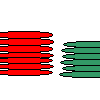Skip over navigation
Resources:
A game board like the one above.
Each player needs two distinctive pieces such as two pebbles.
To play:

Or search by topic
Number and algebra
Geometry and measure
Probability and statistics
Working mathematically
Advanced mathematics
For younger learners
Two Stones
Age 5 to 18
- Game
In China this game is known as Pong hau k'i and in Korea it is called Ou-moul-ko-no.

Resources:
A game board like the one above.
Each player needs two distinctive pieces such as two pebbles.
To play:
Place the two pebbles at the top and two at the bottom as shown below .

Take turns to slide one pebble along a line to an empty spot.
The first move will be to the middle.
To win: block your opponent so that they cannot move.
Next time you play swap start positions on the board with your opponent.
Printable NRICH Roadshow resource.
You may also like
Nim
Start with any number of counters in any number of piles. 2 players take it in turns to remove any number of counters from a single pile. The loser is the player who takes the last counter.

